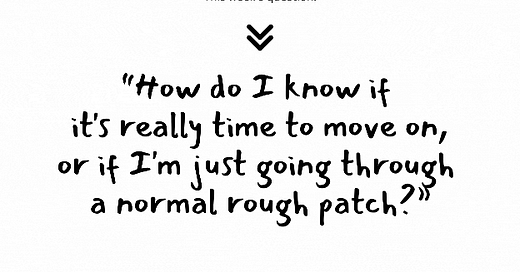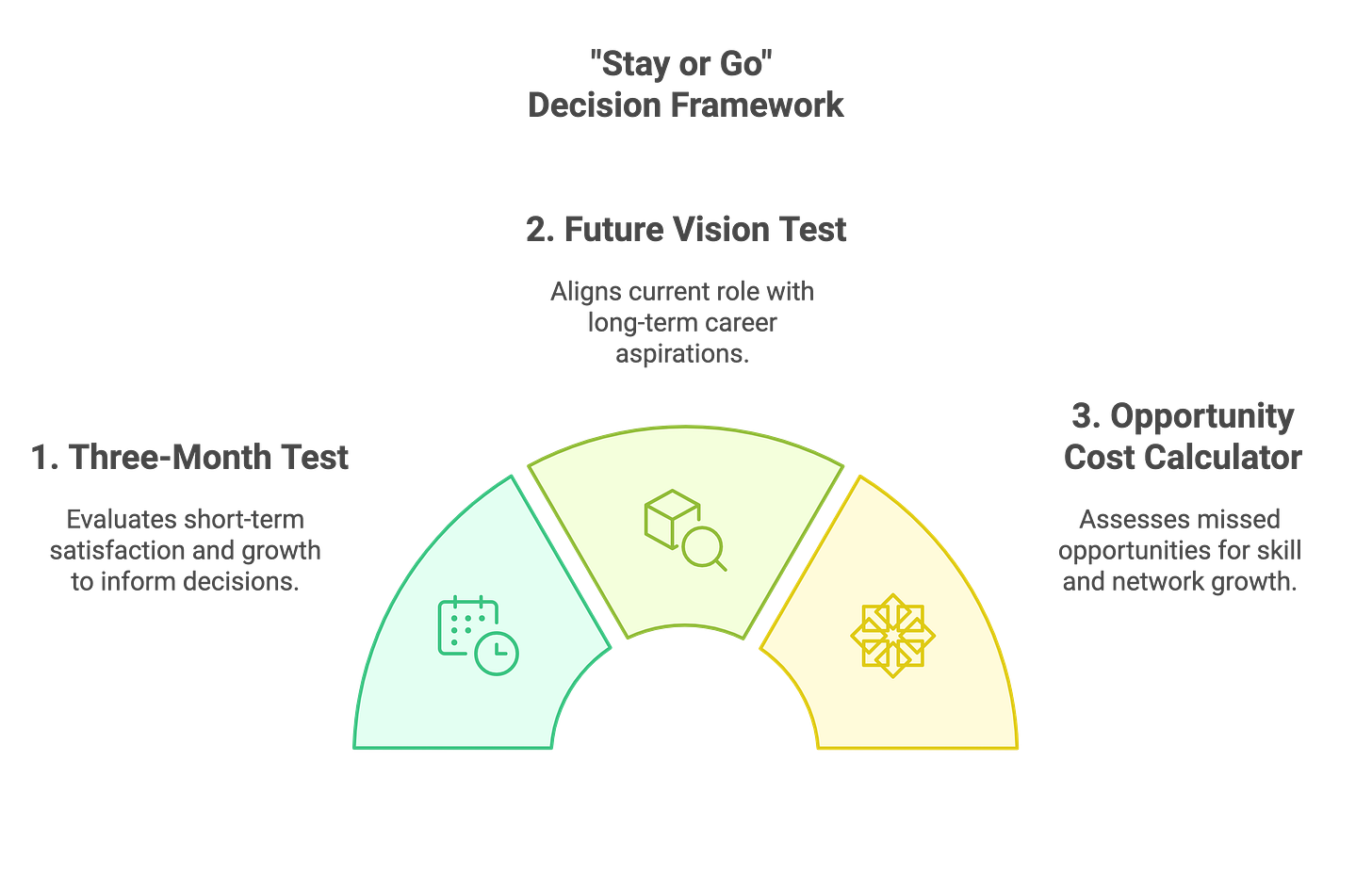🥳 How to Make Career Moves with Clarity and Confidence in 2025
The art of knowing when to move on
👋 Happy Saturday, my dear UX friends, Marina here! I hope this holiday season has given you a chance to relax and reflect! If you’ve found value in UX Mentor Diaries, I’d deeply appreciate your support. Consider sharing, giving it a like and/or becoming a premium subscriber for a fraction of the usual price (and here’s what’s coming in 2025!)
Today, let's tackle a question that many of us grapple with, often in the quiet hours of the Sunday evenings (or, in anticipation of the new year ;)—
"I've been in my current role for two years, and while it's not terrible, something feels off. How do I know if it's really time to move on, or if I'm just going through a normal rough patch? I don't want to jump ship too early, but I also don't want to stay too long . How do I make this decision?"
Needless to say that this question hits close to home for many.
Having mentored hundreds of UXers through their career transitions, I've noticed that the hardest part isn't usually finding the next opportunity—it's knowing when it's truly time to look for one.
Let's break down how to make this decision with clarity and confidence, without letting emotion cloud your judgment.
📈 The 3-Part Career Growth Audit
Before making any moves, let's do a structured assessment of your current situation:
1. The Learning Curve Analysis 🧠
Map your growth over the past 6 months:
Are you still learning new skills?
Have you tackled challenging problems?
Are you growing in the direction you want?
Does your work stretch your capabilities?
🚩 Red Flag: If you can do your job on autopilot, you're probably stagnating.
2. The Impact Assessment 📊
Evaluate your ability to create meaningful change:
Are your design recommendations being implemented?
Do you have a seat at the strategic table?
Can you influence product decisions?
Does your voice carry weight in important discussions?
⚠️ Warning Sign: If you're consistently being treated as a pixel-pusher rather than a strategic partner, that's a problem.
3. The Values Alignment Check ⚖️
Document where your values clash with reality:
Is user research valued and acted upon?
Does the company prioritize quality over quick fixes?
Are design decisions based on data and user needs?
Does the culture support healthy work-life balance?
🚨 Critical question: Is this environment helping you become the UX professional you want to be?
🚦 Signs It's Time to Move On
From my experience mentoring UXers through transitions, here are the reliable indicators that it's time to start looking:
1. The Growth Plateau ↔️
You haven't learned anything significant in 3+ months
Your role hasn't evolved in the past year
You're not being challenged in meaningful ways
Your skills are becoming outdated
2. The Impact Ceiling ✋
Your strategic input is regularly ignored
You're excluded from important decisions
Your role is becoming more tactical than strategic
You're not able to advocate effectively for users
3. The Culture Mismatch 🚧
UX is seen as a service rather than a strategic function
Research is treated as optional
Quick fixes are preferred over proper solutions
Your work-life boundaries are regularly violated
👉 "Stay or Go" 3-Part Decision Framework
Here's a practical approach to making this decision:
Part 1️⃣
The 3-Month Test 📆
Before making any moves:
Document your daily satisfaction levels (1-10)
Track growth opportunities
Note impact of your work
Record energy levels after work
If after 3 months you see no improvement, it's time to start looking!
Part 2️⃣
The Future Vision Test 👀
Ask yourself:
Where do I want to be in 2 years?
Can I get there in my current role?
What would need to change?
How likely are those changes?
Part 3️⃣
The Opportunity Cost Calculator 💸
Consider:
Skills you're not developing
Connections you're not making
Impact you're not having
Growth you're missing out on
👉 Your Challenge This Week:
Complete the Career Growth Audit
Start your Three-Month Test journal
Write your ideal role description
Compare it to your current reality
🚨 Note About Today's Job Market Situation
(let's address the elephant in the room)
Yes, the job market is more challenging than it was a few years ago.
I've heard many of UXers say, "Maybe I should just be grateful to have a job."
And while gratitude is important, here's what I've observed:
↳ The Hidden Job Market Reality
While high-profile layoffs make headlines, many companies are still quietly hiring
Organizations are particularly interested in UX professionals who can demonstrate business impact
Roles are often filled through networks before they're publicly posted
Companies are still competing fiercely for experienced UX talent who can drive results
↳ The Strategic Approach for Today's Market
Instead of staying in a stagnating role out of fear:
Start building your professional network now (before you need it)
Document your business impact rigorously
Keep your skills sharp through side projects and/or learning
Maintain relationships with previous colleagues and managers
↳ Your Preparation Strategy
If you stay put for now:
Build your financial runway (3-6 months of expenses)
Update your portfolio with recent work focusing on impact and storytelling
Strengthen your online presence (starting now)
Keep a running document of your achievements (always)
Here's what I tell my mentees:
Yes, the market has shifted, but that doesn't mean you should accept stagnation. Instead, it means being more strategic about your move. Take the time to prepare thoroughly, build strong networks, and position yourself as a problem-solver who drives business value.
Economic cycles come and go, but your career growth shouldn't be put on indefinite hold.
It’s really important to be ready to make calculated moves from a position of strength rather than desperate jumps from a place of frustration.
A Success Story Worth Sharing
A UX designer I mentored was struggling with this exact decision. She created what we called a "Growth Gap Analysis" - documenting the difference between her ideal growth path and her current trajectory. This clarity helped her realize she wasn't just being impatient, she was genuinely outgrowing her role. Within 3 months of realizing it and starting her search, she found a position that aligned perfectly with her career goals.
The best time to look for a new opportunity is when you're still comfortable in your current role. This gives you the emotional space to make thoughtful decisions rather than reactive ones.
Quick tip:
Start keeping a "Career Journal" documenting your growth, challenges, and wins. It's amazing how patterns emerge when you look back over a few months of entries!
See you in 2025 🎉,
P.S. If you're feeling uncertain about this decision, try this:
Write a letter to yourself dated one year in the future. What would future-you regret more: staying or leaving?
UX Mentor Diaries helps UXers become (and remain) successful and influential through quick tips, in-depth guidance and personal experience stories. Become a Premium Subscriber for just $9.99 a month or $99 $49 for the whole year and unlock every article and resource in the archive (+ more benefits) + even more benefits coming in 2025 ↴
P.P.S. A few more ways I can help you ↴
Book a 1:1 UX career coaching session—
UX Career Acceleration session - 60 min
During the session, we'll identify your natural strengths and explore how you could lean on them to accelerate your career growth.
If you are a paid subscriber, DM me, and I'll send you a discount code for either of these sessions.
Follow me on LinkedIn for proven UX career strategies.
If you aspire to become a UX mentor, check my book on Amazon.







This article is brilliant, aside from being great advice for the job market it also works to evaluate one’s personal strengths, growth and potential success with current relationships. Thank you so much for sharing.